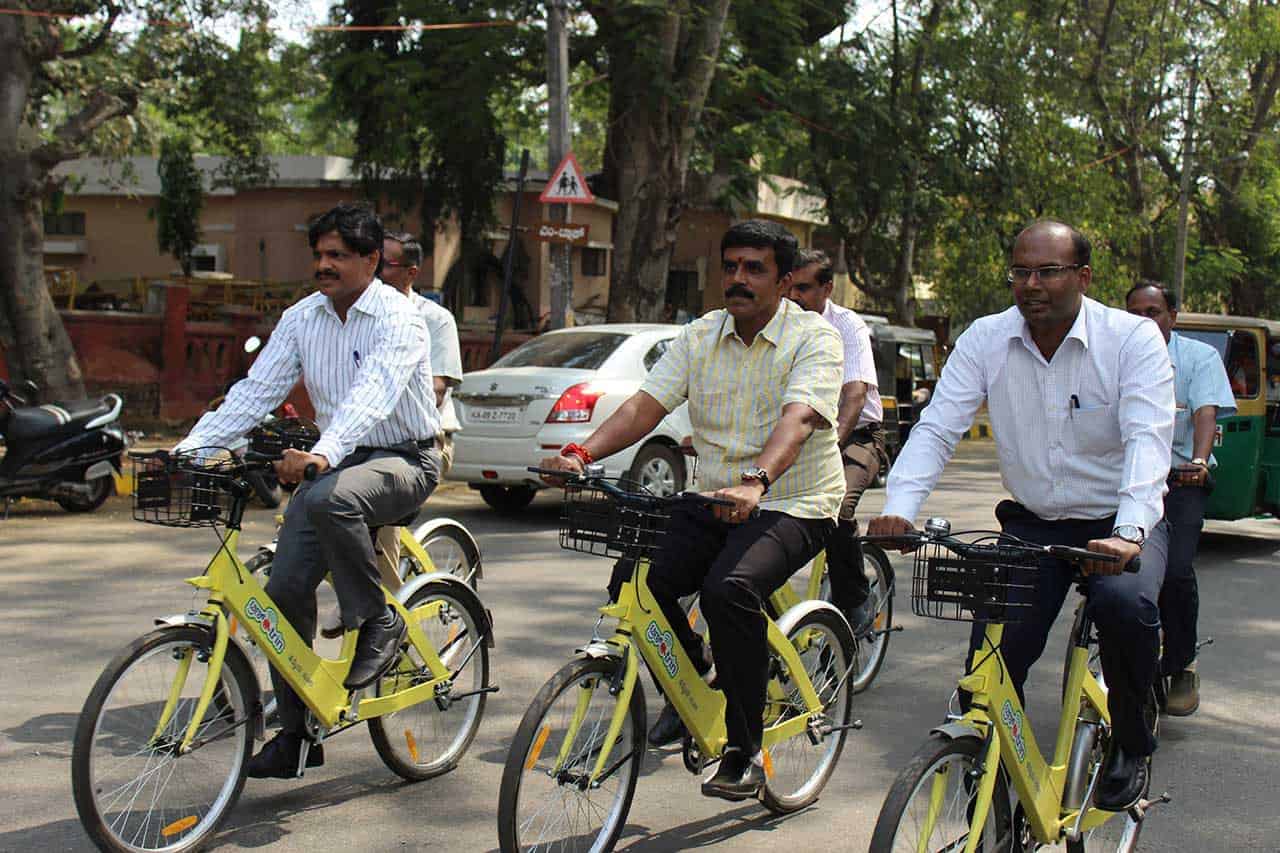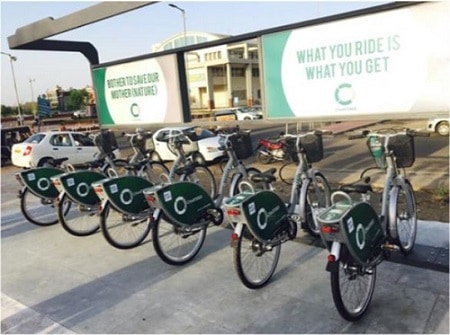If you have walked through the IIT Kanpur campus of late, you would have seen a lot more cycling activity than usual, thanks to Ola’s ‘Pedal’, a new cycle-sharing pilot project. Given the results of its Kanpur experiment, the company hopes to expand gradually to more college campuses, residential townships and tech parks.
Ola put out a statement that summed up its aim to steer the activity in various campuses through “superior technology and availability to book on the same app…” that is hoped to solve “larger issues like pollution and congestion…”
Check out its video here.
Other commercial initiatives – Zoomcar and Yulu
Ola, however, is not the first mover in the space. India’s first private cycle sharing service was offered by Zoomcar, a self-drive rental company, that launched an app called PEDL in October this year. The company has initiated an enterprise involving more than 3,000 cycles in Bengaluru, Kolkata and Chennai. It offers cycle sharing services in many residential societies, corporate office parks, universities, and select layouts.
Another enterprise has been Yulu, launched recently in Bengaluru by Amit Gupta, co-founder of InMobi. Using the Yulu App, you can find out the nearest available bicycle, and unlock it using a QR code. It will enable you to pick up your bike from the nearest point, even as your money gets deducted from the digital wallet in the Yulu App.
Initiatives galore
Interestingly, in the age of big-buck motor cars, cycling appears to be increasingly adopted as a refreshing alternative. The cycle is a green, environment-friendly, sustainable, cheap, space-saving and user-friendly alternative that is already pedaling in around 1,000 cities around the world and enhancing a sinking globe’s hopes for a friendlier future.
Sathya Sankaran, co-founder of Bengaluru’s civic NGO Praja RAAG referenced Shanghai, which has one lakh cycles in its public bicycle system, pointing out that it is crucial to “flood” the city with cycles.
However, while Ola may probably be the most ‘visible’ brand name right now due to its cab-and-autorickshaw hail-rental image, it certainly isn’t the first or only cycling initiative in the country. Apart from private players, several government enterprises have also set the pedal rolling in various cities across the nation.
Delhi
Delhi Metro Rail Corporation (DMRC) has been running a cycle rental service at the Vishwavidyalaya Metro station since 2009. It has teamed up with ‘Greenolution’ to facilitate last mile connectivity. The facility was later extended to Pragati Maidan, Patel Chowk and Indraprastha stations. Commuters wishing to avail the service must fill in easy forms that can be collected from cycle shelters or downloaded from www.greenolution.in and provide photo proofs of their identity.
DMRC also launched its first software-based ‘Public Bicycle Sharing scheme (PBS)’ in January, 2015. It enabled cyclists to borrow cycles from residential areas and pedal up to the nearest Metro station as well as back. With rechargeable smart cards, the riders get easy access. The first facility was inaugurated at the Saket Metro station, and Neb Sarai and bicycle rental shelters were also opened at Hauz Khas and Akshardham Metro stations.
Trin-Trin in Mysuru
‘Heritage’ City Mysuru was the first to adopt a Public Bicycle Sharing (PBS) at the city-level with a very pleasant name – ‘Trin-Trin – Pedal with Pride’.
There are 450 bicycles, 20 of them geared, that can be borrowed from 48 automated docking stations at a number of tourist spots, universities and offices. Users can own a smart card to borrow a cycle from one station and return it at another spot. The user fee is deducted from the card.
Jointly funded by the World Bank, the Global Environmental Fund and the state Directorate of Urban Land Transport (DULT), the bicycles are owned by the Mysuru City Corporation but the programme is operated by Green Wheel Ride, the manufacturer of eco-friendly bicycles that is hoping to net a number of commuters.
Bengaluru plan
Bengaluru, too, plans to initiate a similar cycling enterprise in Karnataka. The Bruhat Bengaluru Mahanagara Palike (BBMP) and DULT plan to start a public bicycle-sharing system, along the lines of the Trin Trin project; according to a media report, the city will see almost 6000 bicycles interwoven around 350 unmanned docking stations in the central business district as well as metro stations.The project is estimated to cost about Rs 80.18 crore. The infrastructure and dedicated cycling tracks will be developed after the regions are identified by the officials in about eight to ten months.
Bhopal
The cycle initiative was started in Bhopal with more than 500 bicycles in June this year. This was publicised as India’s first fully automated bicycle sharing programme and was soon extended to include 12 kms of tracks across 50 locations.
Just one phone app can enable commuters to hire a bicycle here. They just have to register, ask for a custom plan and pay up. The costs worked out to more than Rs 7 crore at a public-private partnership model. Rs 3 crore was generated through the Smart City Mission’s funds, while a private company agreed to meet other expenses.
Cyclo, Jaipur
Last October, Cyclo, the Jaipur Smart City Ltd (JSCL) public bicycle sharing scheme went through at an estimated cost of Rs 5.5 lakh per docking station, and a total cost of Rs 1.10 crore. While it has been initially launched in two locations, Jawahar Circle and Ram Niwas Bagh, it is expected to spread out to 20 locations in phases. If you want to rent a bicycle from one designated docking station and return it to another, you can do so at a nominal rate of just Rs 10 per hour. About 20 cycles are available at each station. You just need to show some proof of identity and fill out a form.
Hyderabad Cycling Club
Just a week ago, as the Hyderabad metro rail was inaugurated, the Hyderabad Cycle system started to fall in place too. As the first set of cycles were lined up at Miyapur metro station, a smart bike station was set up on the pathway between the HMR Pylon and the lift. The number of blue bikes parked in a row at Miyapur are armed with unique numbers, a carriage in the front for luggage and GPS fittings to sensitise the commuters.
You can gear up to ride the all-new geared smart bikes once the bike stations have come up. In order to take advantage of this service, you have to become a member of of the Hyderabad Cycling Club.
Individual initiatives – Namma Cycle and Kerberon Automation
As far back as 2012, the Namma Cycle initiative began with only some inputs from BBMP, BESCOM and Imagine Bangalore in the IISc campus. However, the project did not expand much, mainly because it was still new and did not have enough supporters.
Namma Cycle was piloted by software engineer-turned-consultant Murali Ramanath. He explained that their initial investment was about Rs 45 lakh, which was required just to pay the salaries of hired staff and other overheads. However, they could not manage to break even, Murali said. Yet, he has not given up and is trying to drive his vision through to the end.
Another green startup was Kerberon Automation that began with a bicycle sharing system called ATCAG (Automated Tracking and Control of Green Assets). It is a concept that automatically enables the user to hire as well as return bicycles electromechanically, based on digital authentication via Contact-less Smart Cards.
With nine cycles at three locations currently in Bengaluru, the initiative is run in association with the BBMP and DULT. The automated system has reduced waiting time as well as human intervention and helps to give access to commuters through three docking stations.
Is Ola Pedal special?
Among private commercial initiatives, the Ola cycle pool services, or ‘Pedal’ seems to be an interesting initiative, involving a student community and a commercial company. It has had a trial period of a month or two. Going for rent is easy and quick, just like booking an Ola ride through the app. Just enter a unique code and unravel the lock combination. Then drop it off at the nearest Ola parking and pay its nominal fares..
By the end of the week, OLA will launch its second phase with 400-600 cycles in several cities. The company claims to be ‘unique’ due to its ‘superior technology and sophistication,’ with GPS, QR codes, smart locks and better security features.
Will private initiatives pioneer non-motorised transport?
With the expanding cycle chains promised by Ola, Zoomcar and Yulu, hopes are high that cycling alternatives will catch on quickly.
So what could be the biggest challenges for these initiatives in the cities? A strange one – theft! Wukong in China had to close after 90% of its cycles were robbed in just a few months. In our second most populous country in the world, theft is a real possibility too. So will the companies be able to sustain their initiatives?
Secondly, the dense traffic as well as heavy pollution on the roads make cycle navigation vulnerable and difficult. Would the cycles be able to overcome the odds and ride through?
It is not unreasonable to hope that commercial enterprises such as Ola and the like would be able to anticipate and overcome the challenges of theft, pollution and density. After all, Ola has successfully designed speedy and reasonably-priced solutions for cars, autos and shuttle buses; why would cycles be behind?

